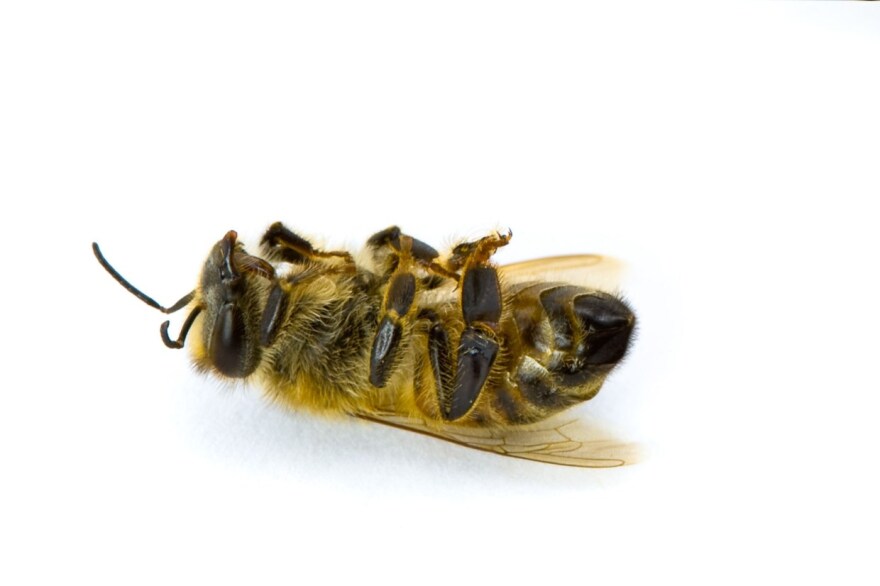Populations of bees and other pollinators around the world have been in decline over the last decade. Research has suggested that one of the likely culprits is an increasingly popular class of insecticides call neonicitinoids.
“Neonics,” as they are called, are chemically similar to nicotine. The poison appears to work on the nerve cells of bees, making them intoxicated so they stop eating or wander away from their hives and die. The seeds of nearly all corn and many other crops are soaked in neonics, so the toxin spreads throughout the plants and their pollen.
The European Union restricted the use of neonics in 2013. And on March 19, the Maryland House of Delegates voted 97-38 in favor of a bill that would make Maryland the first state in the U.S. to limit the use of neonics. This followed a 32-14 vote by the state senate on March 9.
The Maryland Pollinator Protection Act of 2016, which still needs a final vote and signature by the governor, would ban household customers from buying and spraying neonics on their gardens. It does not address the far wider use of neonics by farmers – with the sponsors trying to avoiding a battle with the politically powerful farm lobby.
But advocates argue the bill is at least a small step forward, because homeowners often over-apply the insecticide. And they say some kind of action is needed because Maryland beekeepers lost 60 percent of their hives last year, alone.
During a recent hearing in a senate committee, toxicologist Jody Johnson detailed the science implicating neonics in bee deaths. She said other factors include a virus, called Nosema ceranae, and parasites, called the varroa mite. But the insecticide appears to play a role in the increasing number of bee deaths caused by both.
“Environmental Scientists around the world have convened and reviewed more than 1,100 peer reviewed articles on neonic exposures and their toxic effects,” said Johnson. “Subtle, low-exposure doses may not kill the bees outright, but instead weaken their capacity to survive. Neonic exposure can change their behavior – bees may avoid a food, or appear disoriented. There are low doses that weaken a bee’s immune system, increasing their vulnerability to parasites such as veroa, pathogens like nosema, and other pesticides.”
Governor Larry Hogan’s administration opposes the bill, as does the agricultural industry. Maryland Department of Agriculture assistant secretary Carol Holko testified against the Pollinator Protection Act, arguing the science supporting it is questionable.
“We don’t have any documented cases of neonicitinoids or any insecticide impacting honeybees in the state of Maryland,” Holko said. “No reports. We have an entire protocol that is developed by EPA, so our pesticide inspectors can go out and investigate these reports. We haven’t gotten any calls.”
However, an independent multi-university survey of beekeepers across the U.S., funded by the U.S. Department of Agriculture (USDA), found that 23 percent of bee colonies died in the winter of 2014-2015, and 61 percent died in Maryland, according to USDA.
Baltimore Beekeeper Bill Castro said that this survey was likely more accurate than the Maryland Department of Agriculture’s reporting system.
“Beekeepers generally don’t report pesticide kills to MDA or pesticide inspectors, simply because the inspectors aren’t testing for neonics,” Castro said. “The testing is also hugely expensive to the beekeeper – every sample, every hive lost, could cost as much as $300 per test.”
Dr. Lise Van Susteren, an assistant professor at Georgetown University who serves on the advisory board of the Harvard School of Public Health, testified that neonics should be restricted because of their potential impact on human health. European Union regulators concluded the insecticides could harm the nervous systems of developing children.
“Neonicitinoids are in our water, in our food -- including in baby food—and they are found in the urine of children,” Susteren said. “In contrast to other insecticides, neonicitinoids cannot be washed off because they are not on the surface of the food. They are inside the food.”
The big picture is this: Restricting the use of the insecticide among just homeowners, in just one state, won’t solve the problem. But Maryland’s bill could create a buzz -- and set a national precedent -- that could help pollinators and consumers everywhere.




